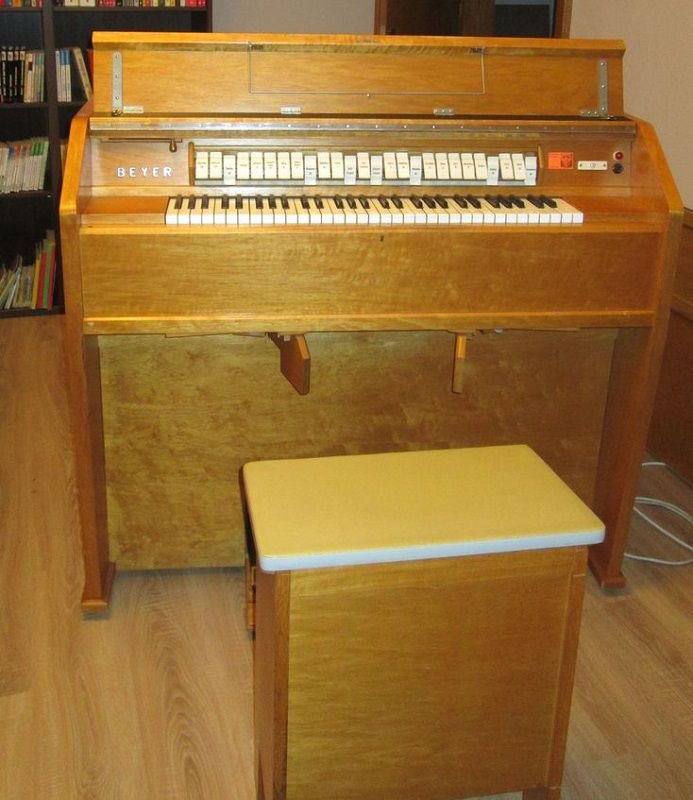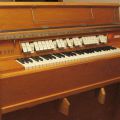Back to list view
Located in NRW, Germany. Pitch is A435, has an E/F break. Optional suction engine (Meidinger, Basel/Switzerland) built into the case.
- Beyer forte knob for opening part of the back of the instrument
- featuring a mixture (2'' Zimbel/Cymbal rank)
- instrument is/can be played VERY loud/powerful - according to the original product leaflet, it was designed to accompany/lead up to 450 worshippers
- reed organ was located in the former Klarissenkloster (Poor Clares Monastery) in Paderborn/Germany, likely from 1963 to 2015, then acquired by the current owner
Updated Comapny notes:- L.M. Beyer founded the company in Wiehe, Thüringen/Thuringia, in 1920. The company was moved to Vlotho/Westphalia in 1928. The current buildings/workshops in Brackwede near Bielefeld (Arthur-Ladebeck-Strasse 185) were acquired in 1933.
L.M.s'' sons Otto, Moritz and Franz joined the company.
- In 1945, L.M. Beyer dies, Franz does not return from the war. Moritz and Otto continue instrument production. It seems that from this time, the company name on the instruments is just "Beyer".
- In 1975, Erhard Beyer, youngest son of Moritz, takes over the company.
Business operations now concentrate on piano restaurations/tuning.
- In 2002, Sebastian Beyer, son of Erhard, joins the company, making this a four-generation business.
- The company has not produced any pressure instruments, contrary to the description in the database. They built around 3,000 suction instruments.
- Beyer forte knob for opening part of the back of the instrument
- featuring a mixture (2'' Zimbel/Cymbal rank)
- instrument is/can be played VERY loud/powerful - according to the original product leaflet, it was designed to accompany/lead up to 450 worshippers
- reed organ was located in the former Klarissenkloster (Poor Clares Monastery) in Paderborn/Germany, likely from 1963 to 2015, then acquired by the current owner
Updated Comapny notes:- L.M. Beyer founded the company in Wiehe, Thüringen/Thuringia, in 1920. The company was moved to Vlotho/Westphalia in 1928. The current buildings/workshops in Brackwede near Bielefeld (Arthur-Ladebeck-Strasse 185) were acquired in 1933.
L.M.s'' sons Otto, Moritz and Franz joined the company.
- In 1945, L.M. Beyer dies, Franz does not return from the war. Moritz and Otto continue instrument production. It seems that from this time, the company name on the instruments is just "Beyer".
- In 1975, Erhard Beyer, youngest son of Moritz, takes over the company.
Business operations now concentrate on piano restaurations/tuning.
- In 2002, Sebastian Beyer, son of Erhard, joins the company, making this a four-generation business.
- The company has not produced any pressure instruments, contrary to the description in the database. They built around 3,000 suction instruments.
| Information | |
|---|---|
| ROS Reg No. | 5785 |
| Date Registered | 2/22/2016 |
| Views | 1043 |
| - | |
| Serial | 2959 |
| Manufactured Date | 1963 Aug. |
| Case Style | Chapel organ |
| Maker Location | Brackwede, Germany |
| Model | Werk 50a |
| Knee swells | Yes |
| Wood | Limba |
| Keys | 61 |
| Manual(s) | 1 |
| Range | F-F |
| Stops | 26 |
| Pump method | Foot and/or blower |
| Stops |
|---|
| Bourdon 16'' |
| Gedeckt 16'' |
| Gamba 8'' |
| Zimbel |
| Cornett 2'' |
| Cornett Echo 2'' |
| Viola 4'' |
| Viola Dolce 4'' |
| Diapason 8'' |
| Baßflöte 8'' |
| Forte I |
| Baßkoppel |
| Vox Humana |
| Diskantkoppel |
| Forte II |
| Hohlflöte 8'' |
| Melodia 8'' |
| Fernflöte 4'' |
| Flöte 4'' |
| Zart 2'' |
| Waldflöte 2'' |
| Zimbel |
| Violine 8'' |
| Echo 8'' |
| Oboe 8'' |
| Gemshorn 8'' |

